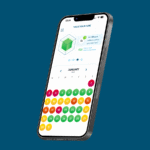Healthcare practitioners: A potential springboard for adherence success
- Healthcare practitioners (HCPs) are uniquely positioned to deliver medication adherence interventions1.
- Communication between HCPs and patient is inadequate2. Enabling HCPs with the required skill-set is pivotal1.
- Improving adherence to medications requires a collaborative team effort from health care professionals3,4.
Optimum disease management requires taking medication in the required dosage at the right time as advised by health care practitioners (HCPs). Patients, however, fail to adhere to the prescription even though they have some idea about the benefits. The World health organization declared that resolving treatment non-adherence will have a far greater impact on human health than improving any specific treatment modalities5. The onus of non-adherence is assumed to lie with the patient. However, clinical studies report a myriad of reasons for this behavior. Chief among them – the one that always features on top of the list – is the communication discordance and a lack of trust between the patient and the HCPs1,2,6. As they say “a good beginning is business half done”, if the patients are provided with comprehensive information about the disease and therapy in the beginning, they are likely to rate higher adherence.
Role of HCPs in improving adherence:
Physicians play a key role in adherence initiation by providing the rationale for the therapy and the roadmap for the treatment plan. Nevertheless, they often fail to impart comprehensive information to their patients2. A study found that adequate information about the name of the drug, its exact purpose, and the associated side effects were provided respectively, only in 74%, 87%, and 35% of the patient-provider encounters2. Implicit conversations lead to misunderstandings, sowing the seeds for non-adherent behavior. HCPs can enhance adherence if they actively communicate with their patients on the following aspects7:
- Health literacy: HCPs are best positioned to provide education about the nature of the disease. They can also enlighten its possible effects on the human body and the pathophysiology. Instructions and explanations provided should be clear and simple. HCPs should make an effort to nudge their patients towards healthier lifestyle choices6.
- Medication information: HCPs should explain the rationale for the therapy along with the basics of drug’s action in simple language. Additionally, they should discuss the therapy limitations, potential side effects, duration of use, frequency, and timing of medication. A narrative style for providing evidence has a greater impact in strengthening belief systems rather than plain statistics about medication8.
- Strengthening the HCP-patient relationship: HCPs engaging in meaningful partnerships with their patients can impact adherence behavior. This helps patients in gaining a true picture of disease severity and the need for medication. Patients are also more likely to be more open about possible factors that can impede adherence6.
- Assessing and addressing non-adherence: Providers should try to assess non-adherence in a non-judgemental manner. They should look out for clues that are a hallmark of non-adherence like missed appointments. They should try to determine the cause of non-adherence and suggest appropriate solutions6.
It takes a team to make an impact:
When challenges are big, we must rally together. It is to be noted that physicians are hard-pressed for their time. Hence, we need to distribute the burden on the team of non-physician HCPs. A recent review highlights the importance of a team of healthcare professionals – physician and non-physician – collaborating to raise the adherence quotient higher3,4. In the patient-centric approach, different stakeholders of healthcare delivery – general physician, specialists, nurses, therapists, social workers, and pharmacists – should come together to enhance adherence.
- Physicians: They are at the center of patient care, from diagnosing the ailment and initiating therapy to assessing the success of the therapy. Since they only have limited time to spend with their patients, they can help lay the foundations of adherence that can be built upon by other non-physician-HCPs.
- Nurses: They are called the connecting link between the patients and physicians because of their accessibility and are trusted by both groups. Nurse-led interventions have been shown to enhance adherence, albeit moderately9,10.
- Pharmacists: Pharmacists are at the forefront of the patient-provider interface although, in an informal setting. Other than the traditional roles of medication dispensing, pharmacists can extend their services toward medication adherence. Receiving therapy information in an informal setting can boost the adherence profile of patients in addition to gaining awareness about the disease and therapy11,12.
- Dieticians: They can be crucial in guiding patients to healthy food habits and lifestyle choices in addition to overseeing adherence to the diet plan13.
Bridge the communication gap – communication skill training for HCPs:
The first and foremost question that needs to be addressed is – are HCPs equipped with the wherewithal to impart effective communication to improve adherence. The answer is most often – no2,14. It is imperative to arm them with the required skill-set for a patient-centric approach to deliver on the following1:
A. Defining and explaining – disease and therapy
B. Discussing pros and cons – regarding the benefits of therapy and potential side effects
C. Eliciting patient’s preferences, – understanding their ability and self-efficacy
D. Assessing patient understanding. – about the communication provided
The communication skill training for HCPs includes:
- Building a relationship with the patient: Healthcare begins with trust and it is paramount for achieving effective treatment. The training includes emphasis on building the patient-HCP relationship, compassionate communication, responding to emotions, and offering support.
- Information gathering skills: Training HCPs to communicate effectively with patients to gather disease information by asking open questions or leading questions is important. They should facilitate patient communication by clarifying and summarizing.
- Awareness about undesirable behavior: Generating awareness about blocking behavior like interruptions, providing false reassurances, or providing only factual information that could lead to inappropriate patient response.
- Explaining and planning skills: HCPs should be trained to deliver appropriate information by explaining and checking for understanding. It should enable them to negotiate procedures and plan for future arrangements15.
HCPs would benefit by attending short training sessions and conferences to gain knowledge and build skill-set. Meetings like the Acare congress can help them to understand the issue of non-adherence and expose them to potential solutions.
Evaluating the HCPs mediated interventions for adherence:
Research in this aspect favors a team effort for alleviating adherence4. Although physician-led approaches do have a positive impact on medication adherence, they tend to be less effective than desired. Studies advocate employing a specialized pool of health care practitioners with skills in pharmaceutical counseling and behavioral interventions for a more practical, effective, and economical way of addressing non-adherence3.
Communication skill training has produced effective results in improving HCP communication skills. However, it is still up for debate whether the effects of these interventions can be sustained over a long time or which programs are more likely to work. Also, it was shown to have limited benefits for overall patient’s physical and mental health as well as patient’s satisfaction with the visit15. Moreover, a physician-centric approach has the downside of overburdening them. To overcome this issue, HCPs should be educated about the easily identifiable patient characteristics for stratifying patients in high- and low-risk of non-adherence for providing a tailored communication and risk-appropriate intervention that is not very taxing on their time.
Table 1: Key identifying features of patients at high risk for non-adherence
| Factors | Risk categories | High risk groups |
| Socio-economic | Income | ≤average income |
| Education | No education, ≤high school education | |
| Insurance | No insurance, state insurance | |
| Working status | Non-working part-time working | |
| Marital status | Unmarried Divorced | |
| Demography | Age | Adolescents Older adults Middle-age adults |
| Gender | Females Non-binary | |
| Race | Non-white African American Asian | |
| Acculturation | Immigration Language barrier | |
| Disease-related | Comorbidity | Two ≥two |
| Severity | Severely ill Terminally ill | |
| Health literacy | ≤average | |
| Adherence history | Past of non-adherence Missing appointments | |
| Beliefs | Higher concern beliefs Less trust in the Western medication system Rates alternative therapy higher |
The “talk-home” message for HCPs to enhance adherence2,6:
- Invest time in knowing patients and forging a trusting partnership.
- Help them to understand the medications and where possible simplify the regimen.
- Encourage them to read the medication label carefully and give clear but simple instructions.
- Encourage participation from family members or friends during health visits.
- Incorporating the use of technology like mobile apps.
- Continual reassessment during the follow-ups for non-adherence.
- Initiate shared decision-making during the therapy.
- Guide towards reducing the cost of the treatment.
HCPs work begins with diagnosis, but gets completed when the treatment is successful. They could provide the best treatment, but if patients are non-compliant, the treatment will not succeed. They should leverage the trust placed in their hands by the patients to effectively communicate and enable a trusting environment for their patients. These small steps can bring big gains for adherence to treatment and consequently its success6.
“If doctors just spent more time with their patients so they felt more reassured, that might help.”
– Irvin Kirsch, Psychologist, Harvard medical school













